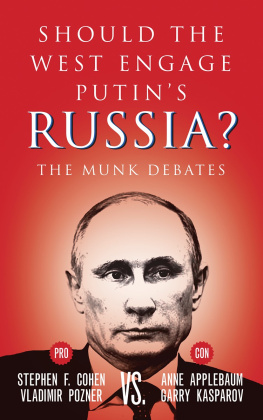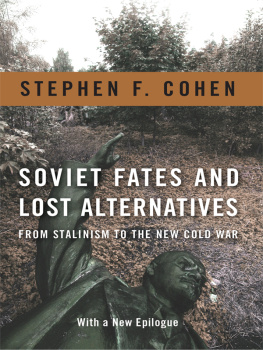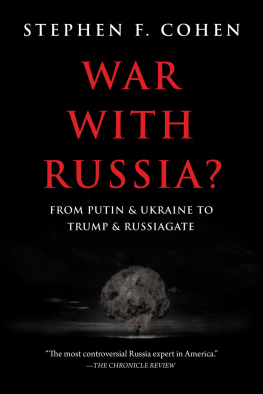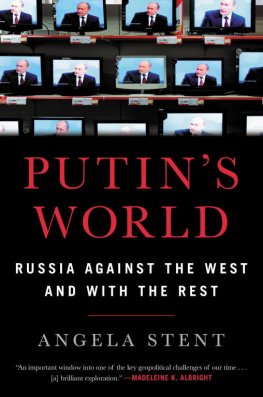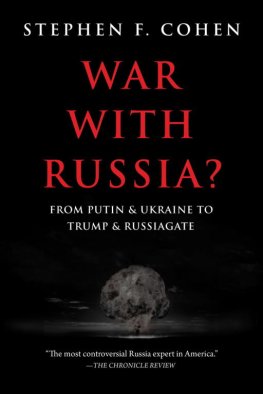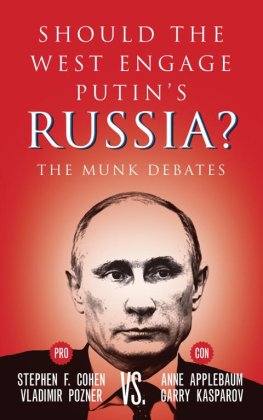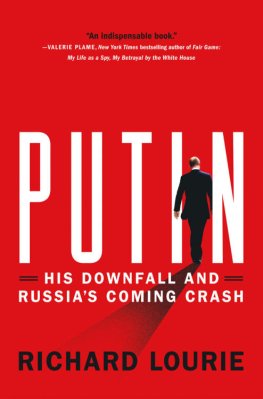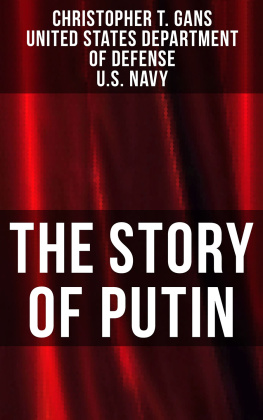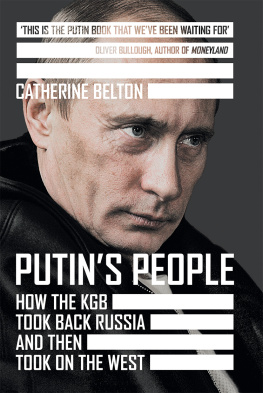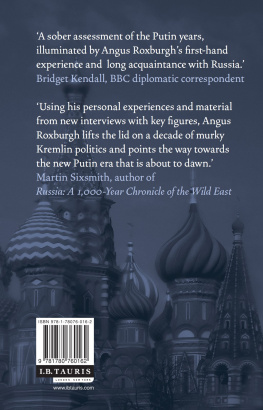A LETTER FROM PETER MUNK
Since we started the Munk Debates, my wife, Melanie, and I have been deeply gratified at how quickly they have captured the publics imagination. From the time of our first event in May 2008, we have hosted what I believe are some of the most exciting public policy debates in Canada and internationally. Global in focus, the Munk Debates have tackled a range of issues, such as humanitarian intervention, the effectiveness of foreign aid, the threat of global warming, religions impact on geopolitics, the rise of China, and the decline of Europe. These compelling topics have served as intellectual and ethical grist for some of the worlds most important thinkers and doers, from Henry Kissinger to Tony Blair, Christopher Hitchens to Paul Krugman, Peter Mandelson to Fareed Zakaria.
The issues raised at the Munk Debates have not only fostered public awareness, but they have also helped many of us become more involved and, therefore, less intimidated by the concept of globalization. It is so easy to be inward-looking. It is so easy to be xenophobic. It is so easy to be nationalistic. It is hard to go into the unknown. Globalization, for many people, is an abstract concept at best. The purpose of this debate series is to help people feel more familiar with our fast-changing world and more comfortable participating in the universal dialogue about the issues and events that will shape our collective future.
I dont need to tell you that that there are many, many burning issues. Global warming, the plight of extreme poverty, genocide, or our shaky financial order: these are just a few of the critical issues that matter to people. And it seems to me, and to my foundation board members, that the quality of the public dialogue on these critical issues diminishes in direct proportion to the salience and number of these issues clamouring for our attention. By trying to highlight the most important issues at crucial moments in the global conversation, these debates not only profile the ideas and opinions of some of the worlds brightest thinkers, but they also crystallize public passion and knowledge, helping to tackle some of the challenges confronting humankind.
I have learned in life and Im sure many of you will share this view that challenges bring out the best in us. I hope youll agree that the participants in these debates challenge not only each other but also each of us to think clearly and logically about important problems facing our world.
Peter Munk
Founder, Aurea Foundation
Toronto, Ontario
SHOULD THE WEST
ENGAGE PUTINS
RUSSIA?
POZNER AND COHEN VS.
APPLEBAUM AND KASPAROV
THE MUNK DEBATES
Edited by Rudyard Griffiths
Copyright 2015 Aurea Foundation
Anne Applebaum, Garry Kasparov, Stephen F. Cohen, and Vladimir Pozner in
Conversation by Rudyard Griffiths. Copyright 2015 Aurea Foundation.
Post-Debate Commentary by Edward Greenspon. Copyright 2015 Aurea Foundation.
Post-Debate Commentary by Steve Paikin. Copyright 2015 Aurea Foundation.
All rights reserved. No part of this publication may be reproduced or transmitted in any form or by any means, electronic or mechanical, including photocopying, recording, or any information storage and retrieval system, without permission in writing from the publisher.
Distribution of this electronic edition via the Internet or any other means without the permission of the publisher is illegal. Please do not participate in electronic piracy of copyrighted material; purchase only authorized electronic editions. We appreciate your support of the authors rights.
This edition published in 2015 by
House of Anansi Press Inc.
www.houseofanansi.com
Library and Archives Canada Cataloguing in Publication
Should the West engage Putins Russia? / by Stephen F.
Cohen and Vladimir Pozner (pro) vs. Anne Applebaum and
Garry Kasparov (con); edited by Rudyard Griffiths.
(The Munk debates)
Issued in print and electronic formats.
ISBN: 978-1-77089-858-5 (paperback). ISBN: 978-1-77089-859-2 (html).
1. Russia (Federation) Foreign relations Western countries.
2. Western countries Foreign relations Russia (Federation).
3. Sanctions (International law).
I. Cohen, Stephen F., panelist II. Kasparov, G. K. (Garri Kimovich), panelist
III. Pozner, Vladimir, panelist IV. Applebaum, Anne, 1964, panelist
V. Griffiths, Rudyard, editor VI. Series: Munk debates
JZ1616.A5S56 2015 327.4701821 C2015-904735-8
C2015-904736-6
Library of Congress Control Number: 2015944670
Cover design: Alysia Shewchuk
Transcription: Rondi Adamson
We acknowledge for their financial support o f our publishing program the Canada Council for the Arts, the Ontario Arts Council, and the Government of Canada through the Canada Book Fund.
CONTENTS
Introduction by Rudyard Griffiths
Should the West Engage Putins Russia?
Pre-Debate Interviews with Rudyard Griffiths
Post-Debate Commentary
Acknowledgements
About the Debaters
About the Editor
About the Munk Debates
About the Interviews
About the Post-Debate Commentary
INTRODUCTION BY RUDYARD GRIFFITHS
It is the geopolitical debate of the moment: How should the West respond to the actions of Vladimir Putins Russia? For some the answer is obvious. Russias annexation of Crimea and its waging of a hybrid war in eastern Ukraine that has left over 6,000 people dead and another 16,000 wounded demands a concerted and forceful international response. Russia should be subjected to crippling economic sanctions targeting not just Putin and his inner circle but the countrys banking, energy, and industrial sectors. Russia should be kicked out of the West-led international institutions that had previously welcomed Russian participation. The embattled Ukrainian military should be supplied with lethal defensive weapons to target separatist artillery and mortars. The North Atlantic Treaty Organization (NATO) should deploy troops to the Baltic States and threaten the use of military force if Russia tries to violate the sovereignty of a NATO member state. In short, Russia should be made to pay an ongoing and punishing price for its actions in Crimea and Ukraine one steep enough to convince Putin to halt the destabilization of eastern Ukraine and forgo any ambitions he might have to empower Russian minorities in other former Soviet republics. Isolation, not engagement, is the only strategy to contain Russia.
But is taking a hard line on Russia going to further peace and stability in eastern Europe, or the Wests own geopolitical interests? Like any conflict, the origins of the current standoff between Russia and the West are complex and multi-faceted. Since the end of the Cold War, the West has needlessly stoked Russian anxieties about encirclement and regime change by aggressively expanding NATO into the former Soviet bloc. The Wests disregard for Russias sphere of influence is why Putin ultimately reacted the way he did to the ousting of Ukraines pro-Russian government and the installation of a pro-European parliament in Kiev. The conflict in Ukraine isnt as simple as a good versus bad struggle between European reformers and Russian-backed Ukrainian oligarchs. This is a nation deeply divided by history, religion, and ethnicity, and Russia has legitimate concerns about the security of Russian minorities in Crimea and eastern Ukraine. By isolating Putin, the West threatens vital security interests it shares with Russia from Syria to Iran to the balance of power in Asia thereby increasing the risks for global instability and conflict.

